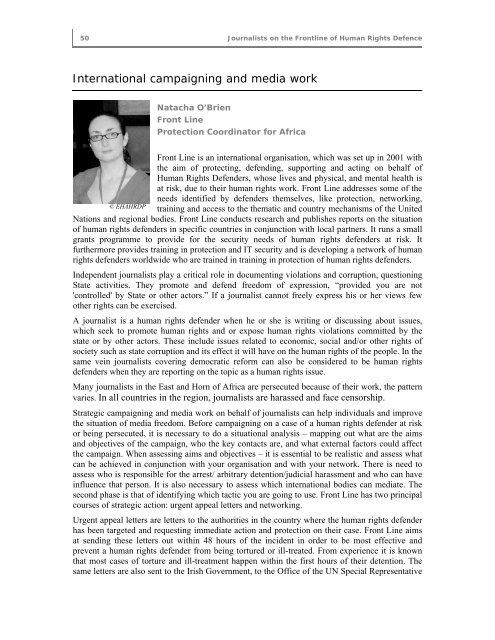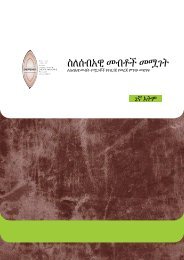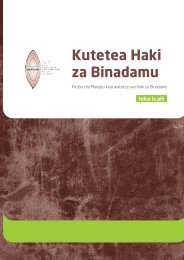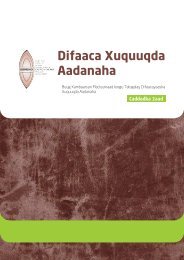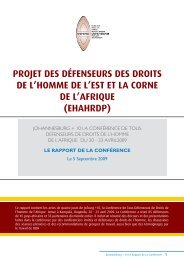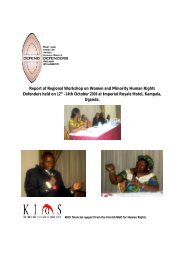English PDF - East and Horn of Africa Human Rights Defenders ...
English PDF - East and Horn of Africa Human Rights Defenders ...
English PDF - East and Horn of Africa Human Rights Defenders ...
Create successful ePaper yourself
Turn your PDF publications into a flip-book with our unique Google optimized e-Paper software.
50Journalists on the Frontline <strong>of</strong> <strong>Human</strong> <strong>Rights</strong> DefenceInternational campaigning <strong>and</strong> media workNatacha O’BrienFront LineProtection Coordinator for <strong>Africa</strong>Front Line is an international organisation, which was set up in 2001 withthe aim <strong>of</strong> protecting, defending, supporting <strong>and</strong> acting on behalf <strong>of</strong><strong>Human</strong> <strong>Rights</strong> <strong>Defenders</strong>, whose lives <strong>and</strong> physical, <strong>and</strong> mental health isat risk, due to their human rights work. Front Line addresses some <strong>of</strong> theneeds identified by defenders themselves, like protection, networking,© EHAHRDPtraining <strong>and</strong> access to the thematic <strong>and</strong> country mechanisms <strong>of</strong> the UnitedNations <strong>and</strong> regional bodies. Front Line conducts research <strong>and</strong> publishes reports on the situation<strong>of</strong> human rights defenders in specific countries in conjunction with local partners. It runs a smallgrants programme to provide for the security needs <strong>of</strong> human rights defenders at risk. Itfurthermore provides training in protection <strong>and</strong> IT security <strong>and</strong> is developing a network <strong>of</strong> humanrights defenders worldwide who are trained in training in protection <strong>of</strong> human rights defenders.Independent journalists play a critical role in documenting violations <strong>and</strong> corruption, questioningState activities. They promote <strong>and</strong> defend freedom <strong>of</strong> expression, “provided you are not'controlled' by State or other actors.” If a journalist cannot freely express his or her views fewother rights can be exercised.A journalist is a human rights defender when he or she is writing or discussing about issues,which seek to promote human rights <strong>and</strong> or expose human rights violations committed by thestate or by other actors. These include issues related to economic, social <strong>and</strong>/or other rights <strong>of</strong>society such as state corruption <strong>and</strong> its effect it will have on the human rights <strong>of</strong> the people. In thesame vein journalists covering democratic reform can also be considered to be human rightsdefenders when they are reporting on the topic as a human rights issue.Many journalists in the <strong>East</strong> <strong>and</strong> <strong>Horn</strong> <strong>of</strong> <strong>Africa</strong> are persecuted because <strong>of</strong> their work, the patternvaries. In all countries in the region, journalists are harassed <strong>and</strong> face censorship.Strategic campaigning <strong>and</strong> media work on behalf <strong>of</strong> journalists can help individuals <strong>and</strong> improvethe situation <strong>of</strong> media freedom. Before campaigning on a case <strong>of</strong> a human rights defender at riskor being persecuted, it is necessary to do a situational analysis – mapping out what are the aims<strong>and</strong> objectives <strong>of</strong> the campaign, who the key contacts are, <strong>and</strong> what external factors could affectthe campaign. When assessing aims <strong>and</strong> objectives – it is essential to be realistic <strong>and</strong> assess whatcan be achieved in conjunction with your organisation <strong>and</strong> with your network. There is need toassess who is responsible for the arrest/ arbitrary detention/judicial harassment <strong>and</strong> who can haveinfluence that person. It is also necessary to assess which international bodies can mediate. Thesecond phase is that <strong>of</strong> identifying which tactic you are going to use. Front Line has two principalcourses <strong>of</strong> strategic action: urgent appeal letters <strong>and</strong> networking.Urgent appeal letters are letters to the authorities in the country where the human rights defenderhas been targeted <strong>and</strong> requesting immediate action <strong>and</strong> protection on their case. Front Line aimsat sending these letters out within 48 hours <strong>of</strong> the incident in order to be most effective <strong>and</strong>prevent a human rights defender from being tortured or ill-treated. From experience it is knownthat most cases <strong>of</strong> torture <strong>and</strong> ill-treatment happen within the first hours <strong>of</strong> their detention. Thesame letters are also sent to the Irish Government, to the Office <strong>of</strong> the UN Special Representative


